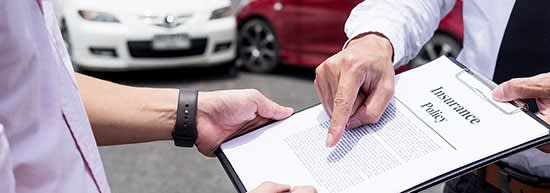
What You Need to Know Before Talking to an Insurance Adjuster
After you report an auto accident to your insurance company, the next time your phone rings, it may well be a representative of the company known as a claims adjuster.
A claims adjuster is a highly trained professional employed by the insurance company to protect its bottom line. In other words, it is their task to get you to say or do something that they can use to either low-ball or deny your claim. These people can be relentless. Once you think you’re done with them and told them everything you can, they may come right back at you with more questions and requests.
The point is: Don’t let them take advantage of you. Get on top of things from the beginning. Or better yet, while you’re injured and recovering at home, let a skilled attorney take over the task while you rest up.
If you’re in or around Lone Tree or Trinidad, Colorado, or in the greater Douglas County and Denver area, rely on our team at Landry Law, P.C. to help you with accident and injury claims. We’ve been dealing with large insurance companies for a long time, and we know how to handle everything they can throw at you.
Dealing with Insurance Adjusters
Unless your accident was only a fender-bender and your injury just the loss of a sense of safety, you may not even want to deal with your insurance company’s adjusters on your own. If you do decide to do so, here are some valuable points to consider:
In all your dealings with the insurers — yours or the other party’s — don’t let emotions dictate how you act or what you say. Remain calm and objective.
Set limitations on yourself and on them. Don’t agree to have the conversation recorded. They have to get your consent, so do not give it. They can later use anything you say against you to diminish or deny your claim, and if it’s recorded, it’s hard to refute or correct a previous statement.
Don’t volunteer information. Stick to the basics — where, when, who, the type of accident, etc. Say the accident is still under investigation and you’ll get back to them. If they ask about your injuries, don’t be specific. Tell them you’re still being examined and treated. Most importantly, don’t admit guilt or fault in anything.
They also may attempt to mail, email, or fax you a medical release form. Don’t sign it until it’s reviewed and approved by an attorney. They’re fishing for something in your medical past that could have led to — or exacerbated — your injury.
If they offer you a settlement, rest assured that the first offer is going to be the lowest they can justify. Don’t accept the first offer. In fact, don’t accept any offer unless your attorney reviews and approves it.
The Best Approach
The stakes are high if you’re injured and seeking compensation. The insurance companies are going to challenge everything in hopes of reducing or eliminating their liability. Their claims adjusters will use every trick they’ve been taught to get you to say or do something they can use to their advantage. They may even begin the conversation by asking how you’re feeling. If you say “fine” or “good,” they can then use that to claim you’re exaggerating — or even fabricating — your injuries.
The better approach to dealing with claims adjusters is to let an experienced auto accident/personal injury attorney deal with them.
Negotiating a Settlement
As mentioned above, the first settlement offer is invariably going to be on the low end. The insurer may gradually increase the offer to make it more tempting, but if you’re injured, your treatment may not end with the issuance of a check. Remember, a settlement is final. If your injury worsens or resurfaces, you cannot go back and ask for more once you’ve settled.
You need to work with your attorney on drafting a demand letter that spells out the compensation you feel is justified to cover all medical and associated expenses now and into the future, as well as any income lost due to missed work while recovering.
If your injuries are serious enough, or if the insurers are stalling in hopes you simply give up (another one of their tactics), you should consider the option of a personal injury lawsuit. A lawsuit will open up your avenues of compensation to include noneconomic factors such as pain and suffering, which insurance policies do not cover.
How Our Team at Landry Law, P.C. Can Help
If you attempt to deal with insurance adjusters on your own, you can never be sure if they’re treating you fairly or cheating you out of what’s really due you in terms of compensation.
An experienced car accident/personal injury attorney can investigate the circumstances and factor in every expense and loss — past, present, and future — to arrive at a fair compensation package, and then negotiate with the insurers to pursue it.
Our team at Landry Law, P.C. will be happy to take on the big insurance companies for you and fight to get the compensation you truly deserve. If you’re injured in or around Lone Tree or Trinidad, or in the greater Douglas County and Denver area, call us immediately for a consultation.
